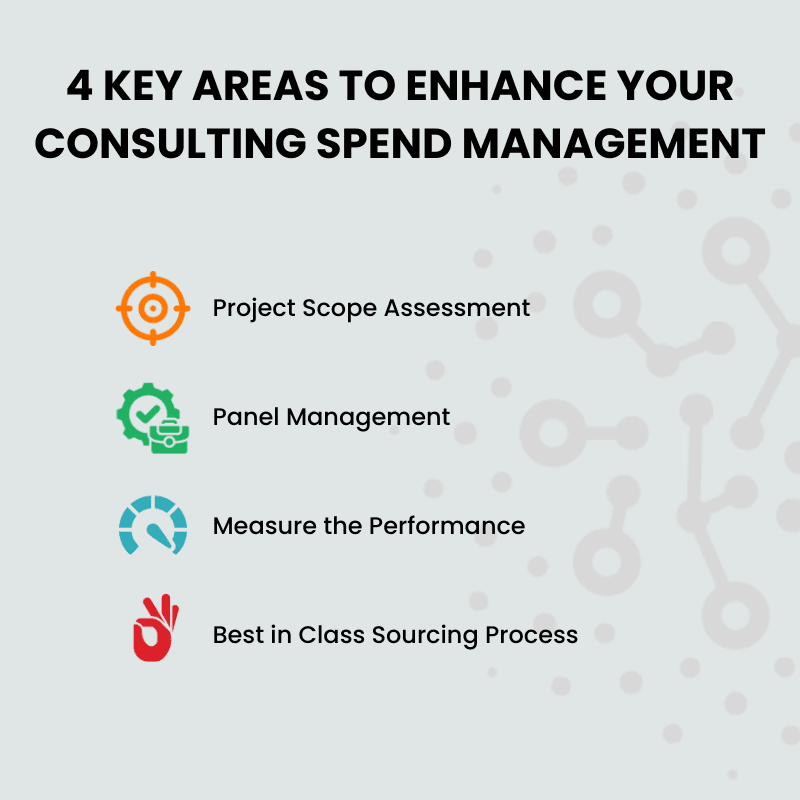Attention top executives, decision-makers, and CFOs! Get ready to uncover the secrets of effective consulting spend management. Whether you’re already working with consultants or considering it, this could be a game-changer for your company’s success. Let’s dive in!
Perhaps you consider consultants a negligible part of your budget and overall business strategy—they are for small, niche projects when you need them and are gone as soon as that business is concluded.
However, from our experience, consulting spend can represent millions of dollars for companies, and if not properly managed (or managed at all), you’ll miss out on the strategic opportunities a consultant can provide.
Today, we’ll explore a self-diagnostic to enhance your consulting spend management. Assess four key areas: project scope, panel management, performance, and sourcing. Let’s refine your current approaches for better results!
1. Project Scope Assessment is the Key to Efficient Consulting Spend Management
When considering the scope of consultants in your day-to-day and annual business, ask yourself these questions.
Do you know the amount your company is spending on consulting on a yearly basis?
The first step toward improving your consulting spend management is to be sure you know just how much you are spending, on average, each year. Knowing this number will put in perspective for you the part consultants play in your business and allow you to better evaluate whether or not you’re seeing a strong return on your current investments.
What special skills do the consultants you employ possess?
More importantly, what skills do your consultants provide that add value to your business and various projects? Look at the areas in which you are seeking the help of a consultant. What activities could be done in-house? What about out of the house? Are you hiring consultants that fill important skill gaps in your current personnel?
Consultants should fulfill a specific need within your company, whether that be a new perspective, special expertise, or greater authority. Understanding this will help establish the scope of consultants you are currently working with.
How does the work of your consultants align with your key strategic needs?
What are your needs this year and from year to year? In order to manage your consulting spend, you need to understand how your consultants’ skills align with your business’s needs. When looking at your consulting spend through a strategic lens, does your resource allocation align with your strategic intent
Are there areas where you could reduce costs? Areas where you should invest further? Too many companies tend to allocate their consulting budget in the same way, every year when a dynamic resource allocation would be better suited.
What is the rationale for using consultants?
There are many valid reasons for hiring and maintaining ongoing relationships with consultants. Be sure you understand your own. Maintain a clear perspective and encourage (or even demand) that departments keep you apprised of their rationale behind hiring a new consultant.
You should always be able to answer these two questions before bringing a consultant on board: “do we need this person?” and “why?”
2. Manage Your Panel to Always Work with the Right Consultants
When evaluating consultant panels and their usefulness, ask yourself these key questions.
Do you know how to qualify a supplier for a specific project?
Ideally, you should have a process in mind to evaluate a prospective supplier for each project. Less than ideal, perhaps, you have a list of prospective consultant suppliers and tend to go to one or two of your favorites without weighing specific specialties and strengths but simply trusting their reliability.
Be sure you understand what each of your potential suppliers is bringing to the table and how that might complement a specific project.
Are you using a panel of qualified suppliers?
Do you have a ready-made panel of suppliers who you know to be experts in fields you need for your business? Perhaps you do not. Check-in with your departments and find out how they access qualified services, and make sure that they have a predictable, responsible source of talent. Vet your suppliers to ensure that you are getting reliable and highly qualified consultants.
Do you easily find the expertise you need?
When the need for a consultant arises, are you able to quickly and easily find the best consultant or consultants for the job? Ideally, for any highly technical requirements, you should have a trusted advisor you can turn to for guidance that will have a selection of candidates on hand. With the right partner, it should be simple to access qualified consultants with the expertise you need.
Are your usual vendors always available to provide the necessary expertise?
Consider this question carefully. Review past projects and times you needed third-party expertise from your trusted vendors. How did it go? Were your suppliers there when you needed them?
If things did not go well, then that is a sign that you need to look at panel management and revise your approach, perhaps your panel list, and, almost definitely, your process for soliciting the expertise you need when you need it.

3. Measure the Performance to Key Only the Best
Once you have the consultants you want doing the work you need, you still need to monitor their performance. Here are some questions to ask regarding the performance management process.
Do you manage the performance of your suppliers?
Ideally, you should be, but the reality is that such performance management may be slack, especially in long-term business relationships. If you are not managing performance, or if that management is ill-defined, here is where you need to start.
Set up benchmarks for the performance of your suppliers and be sure that they are meeting those expectations.
Are you usually satisfied with the ROI of assignments?
Another key indicator of a good or bad business relationship is whether or not you are seeing a strong return on your investment. If you are keeping an eye on costs and scope, here is where you can follow up by making sure that your consultants are justifying their costs.
If you are not consistently satisfied with the ROI of consulting assignments (and how can you know unless you are monitoring), then you are not properly managing your consulting spend.
Have you benchmarked consulting costs with your peers?
Once you know the costs of your consultants and what you are getting for your investment, it is important to make sure that you are still running lean and staying competitive. As with any expenditure you make, compare your spending to that of your peers.
If you are spending more than others in your industry on consulting services, take a look at your process and see where it might be improved. Also, if you buy large amounts from the same vendors, are you getting the rebates you should?
Do you provide detailed feedback to your consultants?
Communication works best both ways. Whether for good or for bad, a reputable consultant will appreciate the honest feedback.
Clear communication allows you to improve your business’s bottom line and the overall business-consultant relationship.
It may be easier to provide a list of requirements and say nothing until the work is done, but detailed, regular feedback can go a long way toward ensuring the project gets done right the first time around.
Do you discuss feedback to improve your relationship with your consultants?
Once you have provided feedback, to maximize the effect, consider setting aside time to discuss what you have found.
Give time for the consultant to ask his or her own questions. Again, good communication goes both ways.
With solid metrics and a plan in mind, you have what you need to improve your relationship for this project and for future projects to come.
4. Implement a Best-in-class Sourcing Process
The last area of concern for consulting is how you are managing the sourcing process. To diagnose the effectiveness of your current sourcing process, ask yourself these questions.
Do you have a process for acquiring consulting services?
Having a clear plan in place for how you acquire consultants is imperative to improving your consulting spend management. This process should be in writing and followed by all departments involved with the hiring of consultants.
If you have gone through all of the above self-diagnostic questions, consider formalizing your process in writing if you have not already. Also, make sure a professional buyer is involved in the process.
Do you have frame contracts set up with your major suppliers?
Once you have everything else in place, you should have general frame contracts with consultant suppliers with whom you do regular business.
In this way, you can set up general fees with understood benchmarks, generate volume and loyalty-based rebates, and minimize your procurement time later.
Do you include performance in your criteria of choice?
When discussing with your suppliers the criteria you have for consultants, be sure that they are taking performance on past projects into account.
A good supplier should be thoroughly vetting their candidates and checking references from previous employers to ensure that their consultants have the experience and positive track record they say they do.
Don’t let other, seemingly more important criteria push aside performance results.
Do you systematically use Confidentiality Agreements when discussing your needs with consultants?
Even before you hire a consultant, in the course of discussing your needs, you may need to divulge privileged proprietary information. Make sure that your sourcing process includes a confidentiality clause so that your competitors – and others – will not know what you are doing and why.
Suppose you have answered “yes” to most of the questions in this self-assessment; congratulations! You are among the 7 percent of buyers who consider themselves fully equipped to manage their consulting spend.
However, more likely, you have probably just realized that you now have a blueprint for improving your performance, generating tremendous savings, and getting more value from your consultants.
Rounding-Up
As consulting sourcing innovators, we aim to improve the overall performance of the consulting industry by carefully vetting our consultants and working closely with both consultants and businesses to facilitate more positive working relationships.
We understand that there are many moving parts when it comes to effective consulting spend management. We would love to hear your feedback on this self-diagnostic tool.
If you found it helpful, please share how it has benefited you and what actions you’ve taken based on its insights. Your input is valuable to us!
consulting spend management consulting spend management consulting spend management consulting spend management consulting spend management consulting spend management consulting spend management
consulting spend management consulting spend management consulting spend management consulting spend management consulting spend management consulting spend management consulting spend management
consulting spend management consulting spend management consulting spend management consulting spend management consulting spend management consulting spend management consulting spend management

How Consource Can Help?
With Consource, start treating consulting as a strategic investment. Choose the right consulting projects that align with your company’s strategy, implement demand management, budget adherence, and spend analysis. Ensure optimal results and maximize ROI.








0 Comments